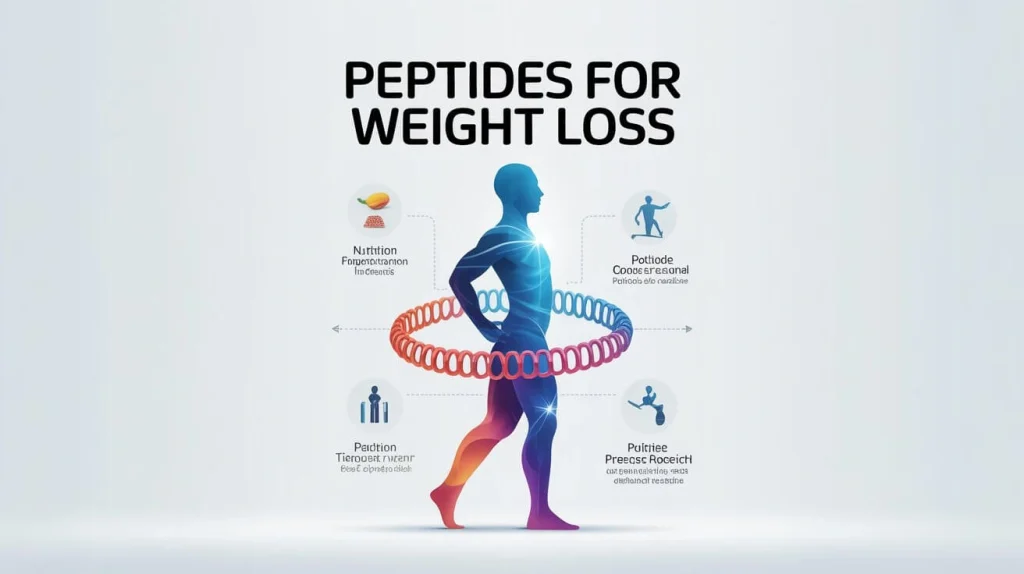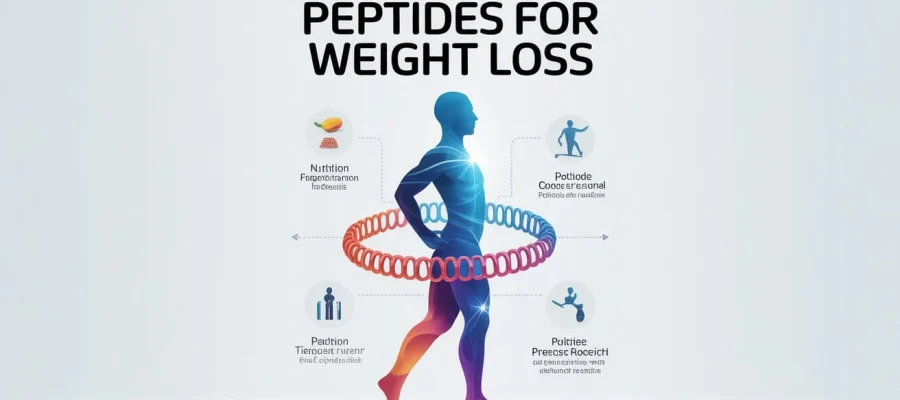Losing weight isn’t always as simple as eating less and moving more. For many people, biology and hormones play a larger role than willpower. That’s where peptides for weight loss come in—a cutting-edge option gaining traction for its ability to support metabolism, reduce cravings, and improve fat burning. But how do peptides actually work? And are they safe?

Content
What Are Peptides?
Peptides are short chains of amino acids—basically small proteins—that act as messengers within your body. These signaling molecules influence everything from energy production to hormone release. In weight management, certain peptides can impact how your body stores fat, controls appetite, and burns calories.
Think of peptides as hormone whisperers: they nudge your body in the right direction to optimize fat loss, improve muscle retention, and balance key systems like insulin sensitivity and metabolism.
How Do Peptides Work for Weight Loss?
When used for weight loss, peptides target several biological pathways:
- Appetite suppression – Some peptides, like GLP-1 receptor agonists, mimic natural satiety hormones to reduce hunger and curb overeating.
- Improved insulin sensitivity – Better insulin response means less fat storage and more efficient energy use.
- Increased fat oxidation – Peptides such as AOD 9604 and Tesamorelin are known to stimulate the breakdown of stored fat.
- Muscle preservation – Weight loss often leads to muscle loss, but peptides like CJC-1295 and Ipamorelin help retain lean mass while cutting fat.
By combining these effects, peptide therapy supports sustainable, medically guided weight loss.
Benefits of Peptides for Weight Loss
Many people turn to peptide therapy for weight loss after struggling with traditional methods. The benefits go beyond shedding pounds:
- Boosts metabolism for more calorie burn throughout the day
- Decreases appetite and reduces emotional eating
- Improves hormone balance, particularly growth hormone and insulin
- Supports muscle retention even during calorie restriction
- May improve cardiovascular markers like cholesterol and blood sugar
- Increases energy and focus, making it easier to stay active
These advantages make peptides a strong tool for those who have hit weight loss plateaus or have hormone-related challenges like PCOS or metabolic resistance.
Is Peptides Safe for Weight Loss?
When prescribed by a qualified provider and used under medical supervision, peptides are generally safe. However, as with any therapy, there are potential side effects to watch for:
- Nausea or digestive discomfort (often with GLP-1 type peptides like Semaglutide or Tirzepatide)
- Fatigue or mild water retention
- Changes in blood sugar or appetite that may require dosage adjustments
Working with a trained healthcare provider helps minimize risks and ensures peptides are tailored to your goals and health profile.
Peptide Therapy for Weight Loss: What to Expect
Here’s what the peptide weight loss journey usually looks like:
- Initial consultation – Your provider assesses your hormone levels, lifestyle, and goals.
- Custom peptide protocol – Based on your needs, you might be prescribed a single peptide or a combination (e.g., CJC-1295 + Ipamorelin).
- Ongoing support – You’ll track changes in weight, hunger, energy, and labs with medical oversight.
- Adjustments – Peptide dosing and type may evolve over time depending on your response.
Results vary, but many people begin to notice improved appetite control and fat loss within 4–6 weeks.
How to Use Peptides for Weight Loss
Peptides can be administered in a few different ways:
- Injectable peptides – The most common and effective route. Injections are typically given subcutaneously once daily or a few times a week.
- Oral peptides – Available for some types but often have lower absorption and weaker effects.
- Nasal sprays or transdermal patches – Less common and still being researched.
Most users find that injectable peptides deliver the most consistent and noticeable results.
Peptide Injections vs. Oral Peptides: Which Is More Effective for Weight Loss?
| Feature | Injectable Peptides | Oral Peptides |
| Absorption | High | Variable/Low |
| Onset of Action | Faster | Slower |
| Effectiveness | Strong, well-documented | Mild and inconsistent |
| Ease of Use | Requires injection, but well tolerated | Convenient, but may lack potency |
| Examples | CJC-1295, Ipamorelin, Semaglutide | Limited (some GLP-1 analogs) |
Verdict: For optimal results, injectable peptides for weight loss are typically the preferred option due to superior absorption and effect.
Final Thoughts on Peptides for Weight Loss
If you’ve struggled to lose weight despite diet and exercise, peptide therapy may offer a science-backed solution tailored to your biology. By targeting key hormones and metabolic processes, peptides for weight loss can support fat loss, muscle preservation, and better appetite control.
As with any medical treatment, it’s crucial to work with a licensed provider to find the right peptide and dose for your unique needs. When used correctly, peptides can help unlock results that last—and help you feel better along the way.
FAQs
What are peptides for weight loss?
Peptides for weight loss are amino acid chains that signal the body to boost metabolism, reduce hunger, and promote fat burning.
How do peptides help you lose weight?
They regulate hormones like insulin and growth hormone, helping reduce appetite, increase fat breakdown, and preserve muscle during weight loss.

Karen is a health blog author who has been writing about healthy living since 2013. She started her journey by adopting a vegan diet and eating only organic foods, but the more she learned, the more she realized that we should all be eating plant-based diets exclusively. As an expert in nutrition and wellness, Karen blogs to educate readers on how they can live happier and healthier lives through food choices!













